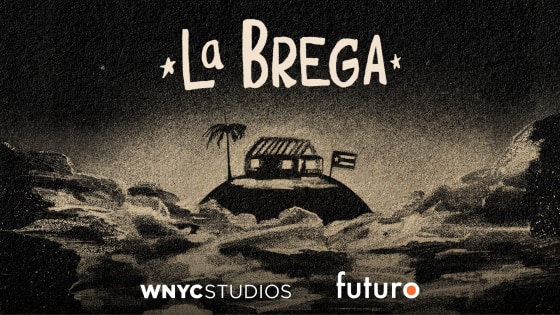The shared experiences of Puerto Ricans — from a Caribbean island that is a U.S. territory but not a state — can be described as "la brega," which loosely means "the struggle" or "the hustle."
That's the name a group of Puerto Rican journalists and scholars have given to an upcoming seven-part bilingual podcast series that explores how Puerto Ricans navigate the island's issues and crises amid the backdrop of its unique history.
"It is this word that we use all the time," New York-born Puerto Rican journalist Alana Casanova-Burgess, host of “La Brega: Stories of the Puerto Rican Experience," told NBC News.
While Puerto Ricans take pride in the ways they overcome adversity, the series seeks to delve into, "why do we do that all the time?" said Casanova-Burgess.
"La brega" describes what Puerto Ricans do when they are faced with a challenge, or even an injustice, they can't resolve — and the only option is to live with it. When Puerto Ricans talk about "la brega," it is implied that an imbalance of power is at work.
"Why do we have a society and a government that asks us to be in "la brega" so often?" said Casanova-Burgess. "It has so many different facets because the term is hopeful in a way, but it's also sad and tiring because, at the end of the day, we deserve more."
The series is co-produced by WNYC Studios, part of the public radio station WNYC, and Futuro Studios.
Casanova-Burgess kicks off the series alongside Puerto Rican scholar and professor emeritus at Princeton University, Arcadio Díaz Quiñones, showing everyday examples of how "la brega" manifests in Puerto Rico. From saving their cars from two-feet wide by 6-inch deep potholes, dealing with expensive and unreliable electricity services and grappling with the closure of hundreds of schools, islanders are constantly fighting against the odds.
The series delves into Puerto Rico's history, from the creation of planned U.S.-style suburbs to the legacy of surveillance from the U.S. files known as "las carpetas." It also delves into the dialogue on colonialism and cultural identity through the 2004 Olympics victory from the Puerto Rican national basketball team against the USA basketball "Dream Team."
Levittown was a massive suburb developed in Puerto Rico during the 1960s with the idea of creating an American-style middle-class on the island. Casanova-Burgess, herself the granddaughter of an early Levittown resident, traced back the history behind the town's boom and bust to explore how its shortcomings in many ways reflect a failed "American Dream" experiment in Puerto Rico.
"Las carpetas," or binders, were files compiled by Puerto Rican police with the support of the FBI used to surveil citizens advocating for Puerto Rico's independence for about 40 years, "but also feminist organizations, unions, basically anybody that was advocating for social change in Puerto Rico," Puerto Rican photographer and journalist Chris Gregory-Rivera told NBC News.
"There was not a fair chance for Puerto Ricans to explore independence as an option, because both the government of Puerto Rico and the United States government did not allow that option to be on the table. And now, we have to 'bregar' with that fact," said Gregory-Rivera, whose six years of reporting on "las carpetas" is also being showcased in an exhibition in Abrons Arts Center in New York City.
"What does that do to a country's ability to participate in civil society and self-determine? As we're talking about another referendum, taking statehood to Congress and a myriad of legal issues about things that have happened over the last few years, you can't ignore that part of the situation that we're in now, has links to this moment in history," Gregory-Rivera said.
Julio Ricardo Varela, vice president of new business for Futuro Studios and the journalist behind the 2004 Olympics episode, said the series is unprecedented and it uplifts Puerto Rican voices. “If we as Puerto Ricans want to change the media landscape, we must continue to create new lanes and opportunities for storytellers. La Brega has done that,” Varela stated.
The show touches on current stories about a community in the island-municipality of Vieques still fighting for access to quality medical services after their only hospital was destroyed by Hurricane Maria in 2017—and it still hasn't been rebuilt. Another episode tackles the island's debt crisis and its toll on thousands of Puerto Rican retirees and former public employees. Both stories are reported by journalists at the Center for Investigative Journalism in Puerto Rico.
"We refer obviously to the debt crisis, but I like using the phrase austerity crisis, because that's what it actually feels like on the ground," said Casanova-Burgess, about the impact of the actions by the federally-appointed fiscal control board as Puerto Rico works its way of out of the largest municipal bankruptcy in U.S. history.
The series ends with an episode featuring Puerto Rican political anthropologist Yarimar Bonilla looking at the territorial status Puerto Rico adopted in 1952—and whether it failed on its promise to decolonize the island from the U.S.
A bonus episode of the podcasts takes listeners behind the music of the series, which was created by Brooklyn-based electronic indie band Balún and Puerto Rico-based group ÌFÉ.
The full series will drop in its entirety in both English and Spanish on Feb. 24 wherever podcasts are available, and select episodes will also be broadcast on the radio on WNYC Studios’ "On The Media" and Futuro Media’s "Latino USA" in the coming weeks.
Follow NBC Latino on Facebook, Twitter and Instagram.

